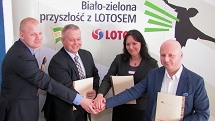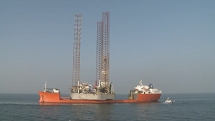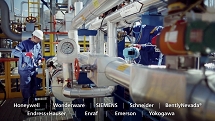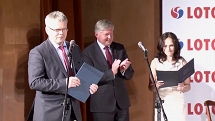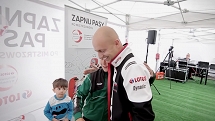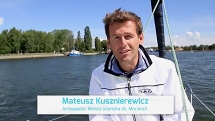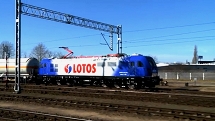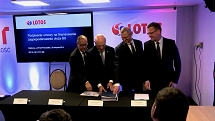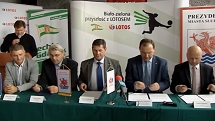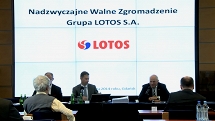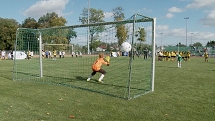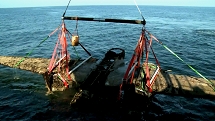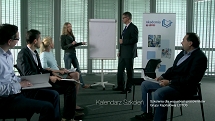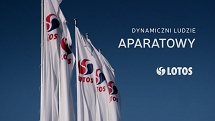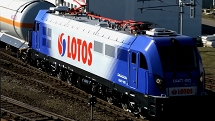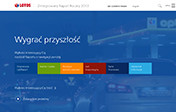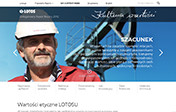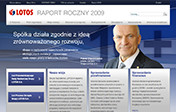-
Financial information
The past year ushered in a series of challenges for the companies in the fuel sector. The decisions made by us have demonstrated that we are able to take rapid steps to adapt to a demanding environment and ensure the desired profitability for our projects.
-
Segment performance
The segmental management model we have implemented enhances management efficiency, delivering cost and revenue synergies across the organization.
-
Letter from the Vice-President of the Board
2014 ushered in a series of challenges for the companies in the fuel sector. The decisions made by the LOTOS Group have demonstrated that we are able to take rapid steps to adapt to a demanding environment and ensure the desired profitability for our projects.
-
Business environment
The key factor that had a strong impact on both the global and Polish petroleum markets in 2014, with significant consequences for the LOTOS Group’s performance, was the price of crude oil, which also determined the price of petroleum products.
-
Strategic objectives
The LOTOS Group’s Strategy is designed to strengthen our position as a strong, innovative and efficient business which plays a major role in ensuring national energy security.
-
Business model
Our operations consist in crude oil production and processing, as well as wholesale and retail sale of petroleum products, among which are: fuels (unleaded gasoline, diesel oil and light fuel oil), heavy fuel oil, bitumens, aviation fuel, naphtha, propane-butane LPG and base oils.
-
Risk and opportunities
At the LOTOS Group, we identify a range of diverse risks, which may affect all areas of our business. The key risks in terms of their impact on our operations are the financial risks as well as risks affecting the exploration and production area. In the analysis of the risks, we also factor in issues related to sustainable development.
-
Key data 2014
With revenue of ca. PLN 28.5bn in 2014, we rank fourth in the group of 500 largest businesses in Poland.

Safe workplace
STATEMENT
Safety and health protection are among the LOTOS Group’s priorities. Our key principle states that ‘no job is too important or urgent that it cannot be done safely’.
Jarosław Jóźwiak
Occupational Safety and Health Office Head, Grupa LOTOS, CSR Strategy Leader in the Improvement of Health and Safety area

We consistently introduce new technical and organizational solutions with the purpose of raising the staff’s awareness and commitment, and to guarantee safe working conditions to all those staying and working at our organization.
All actions we take are in compliance with Polish law, but we also monitor EU regulations as well as international standards and guidelines. In designing and implementing different OSH solutions, we apply the knowledge and experience of our employees − it is them who submit ideas for improving safety and health in their workplaces and suggest actions the employer should take to maintain a high level of safety. We also keep track of what is going on in the refining industry globally − we analyse hazardous incidents, accidents and failures, taking immediate measures to prevent similar situations at our organization. We draw on the health and safety experience of other companies and advisors to implement modern technologies and solutions improving occupational safety. We also learn from our own experience, analysing all hazardous incidents recorded on the premises of the LOTOS Group.
We have been building a strong occupational safety culture for years. We should keep in mind that an enterprise with a high safety culture is characterised by communication based on knowledge, experience, mutual trust and personal responsibility of all employees for everyday matters of safety. In our actions, we place emphasis on education, employee commitment and stimulating the involvement of management, who are obliged to guarantee safe working conditions to employees and motivate them to participate in building a positive work culture. By working closely with contractors and undertaking a number of safety initiatives, the LOTOS Group improves, both directly and indirectly, the standards of safe work also for its contractors and their subcontractors.
We trust our employees, but all the same we follow the principle of zero tolerance for ignoring rules and failing to observe requirements related to occupational safety. Having learnt the lesson from tragic industrial incidents, accidents and failures recorded all around the world, we try not to repeat them. The health and life of our employees, contractors and guests is our paramount concern, but we are aware that the work safety culture we have been arduously developing for years could be easily compromised.
In accordance with our business and CSR strategies, safety at work and health protection are priorities for the LOTOS Group, with respect to both our own employees and the employees of our cooperating partners. Particular attention is given to efforts aiming to maintain high safety standards, minimise risks and reduce accident rates.
Every year, goals and targets are set for the LOTOS Group companies aimed at improving safety at work, adopting uniform standards across the LOTOS Group, and sharing expertise and experience between the OSH specialists. Our CSR strategy in the health and safety area is based on the achievement of a key goal, which is to raise the awareness of and commitment to safety improvement among management staff and employees of all levels as well as subcontractors.
Achievement of this goal is measured by the number of completed occupational safety and health protection projects, the number of educational actions promoting safe working conditions and the LTIF rate. We advance this goal through a set of operational objectives which include:
- implementation of projects to improve safety at work and protect health,
- increasing employees’ influence on the safety and ergonomics of their working environment,
- lowering the accident rate,
- building a safety-at-work culture at the LOTOS Group, based on the management’s increased involvement in promotion of relevant attitudes.
One of the main indicators of the key goal is the achievement of a required LTIF rate, which measures the number of accidents at work per million hours worked. In 2014, the LOTOS Group recorded the LTIF rate of 2.3, against 4.4 in the previous year. 21 accidents were reported, with medical leave taken in 19 cases. This means an about 46% decrease in the accident rate compared with 2013.
Last year, no severe or group accidents treated as accidents at work or confirmed occupational diseases were recorded at the organization. There was, however, one fatal accident of an employee of LOTOS Kolej, which was a result of improper securing of rail cars during shunting work. The company analysed the circumstances of the accident and strengthened supervision over the work of shunting and traction teams.
In addition, four employees of contractors performing tasks for Grupa LOTOS were involved in accidents.
Most accidents occurred when employees were moving around production units, on publicly available roads and in office buildings. Accidents in this category represented 38% of all such events. They were mostly stumbles and slips resulting in ankle or knee injuries. An additional analysis undertaken to identify the causes of accidents revealed that nearly 59% of them were directly attributable to human error, while technical and organizational factors accounted for 29% and 12% of the total, respectively.
Accidents at work
| Grupa LOTOS | 2012 | 2013 | 2014 |
|---|---|---|---|
| Number of employees 1/ | 1,323 | 1,344 | 1,343 |
| Accidents at work, including: | 13 2/ | 12 | 3 |
| Fatal | 0 | 0 | 0 |
| Women | 2 | 1 | 0 |
| Men | 11 | 11 | 3 |
| Post-accident absenteeism (calendar days) 3/, including: | 253 | 302 | 102 |
| Women | 28 | 11 | 0 |
| Men | 225 | 291 | 102 |
| Occupational diseases | None | None | None |
| Lost Time Injury Frequency (LTIF) 4/ (per 1 million hours worked) | 4.3 | 4.5 | 0.9 |
| Lost Day Rate (LDR) 5/ (per 200,000 hours worked) | 0.9 | 0.9 | 0.2 |
| The LOTOS Group 6/ | 2012 | 2013 | 2014 |
| Number of employees 1/ | 4,795 | 4,773 | 4,788 |
| Accidents at work, including: | 34 | 39 7/ | 21 8/ |
| Fatal | 0 | 0 | 1 |
| Women | 5 | 7 | 2 |
| Men | 29 | 32 | 19 9/ |
| Post-accident absenteeism (calendar days) 4/, including: | 1,651 10/ | 1,238 | 784 |
| Women | 196 | 174 | 79 |
| Men | 1,455 | 1,064 | 705 |
| Occupational diseases | None | None | None |
| Lost Time Injury Frequency (LTIF) 4/ (per 1 million hours worked) | 3.3 | 4.4 | 2.3 |
| Lost Day Rate (LDR) 5/ (per 200,000 hours worked) | 0.7 | 0.9 | 0.5 |
1/ Average number of employees at companies reporting OSH metrics.
2/ Including 1 accident treated as an accident at work.
3/ Lost days are counted from the day when medical leave is taken.
4/ LTIF – number of occurrences resulting in inability to work x106/number of hours worked.
5/ LDR – number of occurrences resulting in inability to work x2*105/number of hours worked.
6/ Companies reporting OSH metrics in 2014: Grupa LOTOS, LOTOS Asfalt, LOTOS Kolej, LOTOS Lab, LOTOS Oil, LOTOS Serwis, LOTOS Straż, LOTOS Ochrona, LOTOS Paliwa, LOTOS Infrastruktura, LOTOS Terminale, RCEkoenergia, LOTOS Biopaliwa, LOTOS Petrobaltic. In 2012−2013, LOTOS Tank (currently LOTOS-Air BP) was also taken into account, but due to ownership changes it has been excluded from the list.
7/ In 2013, the LOTOS Group recorded 39 accidents at work (including 5 accidents treated as accidents at work), with medical leave taken in 36 cases.
8/ In 2014, the LOTOS Group recorded 21 accidents at work, with medical leave taken in 19 cases.
9/ Including one fatal accident at LOTOS Kolej in Gdańsk.
10/ Including 380 days of absence due to accidents which occurred in 2011.
A downtrend in the LTIF rate within the LOTOS Group proves we have been taking appropriate prevention measures. It should be noted that a considerable part of our staff perform particularly hazardous work in such places as workshops, active production units, offshore rigs, chemical laboratories or railway tracks. We therefore treat occupational safety as our priority, especially by implementing solutions which go beyond the legal requirements and draw on the world’s best practices in OSH.
In 2014, we pursued our objectives through:
- checks of workplace safety standards at the LOTOS Group companies operating in Poland,
- information and education campaigns promoting workplace safety,
- development of uniform standards on making contractors and guests aware of risks at our companies,
- implementation of the OSH Portal of the LOTOS Group, an electronic tool for monitoring accidents at work and hazardous situations recorded at the organization,
- educational materials concerning accidents at work,
- internal training sessions for the LOTOS Group management to remind them of their OSH responsibilities and duties,
- selection of the safest company and the safest production plant of the LOTOS Group − the titles were awarded to LOTOS Biopaliwa and the Railcars Loading Complex, respectively.
We place emphasis on prevention and education, by means of training, awareness and preventive initiatives designed to minimise the consequences of diseases which may affect our staff.
Every year, Grupa LOTOS monitors the health of its employees, while also providing them with preventive medical care in line with applicable laws. In 2014, no occupational diseases were reported or suspected at the Company.
In 2014, we undertook additional preventive healthcare initiatives for employees of the LOTOS Group, by organizing:
- the 5th Day for Safety and Health at Work, which involved a preventive campaign focusing on anti-cancer tests. Interested employees were able to undergo tests and consult medical professionals. Workshops for women and men, ‘Mysteries and myths of cancer’ and ‘Cervical cancer prevention and breast self-examination’ were also organized;
- training courses on the correct use of automatic AED defibrillators located in publicly available areas on the premises of Grupa LOTOS in Gdańsk;
- practical training for employees of the production area as part of the First-Aid Rescue Team. The course was held in training rooms and at production units. Thanks to regular exercises, employees are prepared to provide aid to their colleagues when accidents occur;
- fire training involving fire-extinguishing equipment (fire extinguishers, mobile trolley units) and first-aid provision for employees participating in periodic OSH training courses irrespective of their position and type of work;
- training on correct response to industrial failures, including evacuation exercises, which makes employees aware of how to leave an endangered area safely and quickly;
- education events concerning issues such as diabetes prevention, healthy lifestyle, first aid, physical activity and exercises, office ergonomics, organization of work in the working environment, safe use of chemical substances and noise protection;
- health-related publications, brochures and posters concerning cancer prevention;
- identification of threats and assessment of occupational risks in the working environment, i.e. thorough examination and assessment of threats that might occur at work. This systematic assessment allows to continuously monitor whether threat mitigation measures applied at a specific work station are adequate;
- employees are made aware of chemical hazards every time a new chemical substance is introduced in the workplace. Our constantly updated electronic record contains safety data sheets and information on the products and chemicals of Grupa LOTOS, and those purchased to support the Company’s operations. This solution enables almost immediate retrieval of information on chemicals (their chemical properties, required protection measures, methods of use or storage) to employees who come into contact with such substances in the course of performing their duties. Apart from safety data sheets and product information, the record includes details concerning the classification of individual substances. By looking at the list of safety data sheets, it is possible to easily identify substances causing specific threats;
- using appropriate collective and individual protection measures in working environments which may negatively impact an employee’s health. Each employee is equipped with protective clothing and personal protection equipment.
Best practice
Concerned about the safety of its employees, in 2014 LOTOS Paliwa organized a second-degree Safe Driving course for the employees whose duties involve frequent business travels as part of the working relationships with representatives of the LOTOS service station chain. The course was attended by 110 persons.
The purpose of the specially designed course was to ensure a higher level of safety to persons who not only must be excellent drivers, but sometimes must perform their business duties while driving. The programme included a refresher course on the key rules of safe driving, correct turning techniques, emergency braking, lane changing in demanding road conditions and recovering from a skid. It ended with a performance test to check the participants’ knowledge.
The second-grade Safe Driving course was a follow-up to the first-grade Safe Driving course organized in 2013. Both courses were conducted by the Driving School of Michał Kościuszko, a racing driver.
The participants’ driving safety has improved thanks to the course. Since the beginning of 2014, no road accidents involving the LOTOS Paliwa’s employees have been recorded. In the evaluation questionnaires, the course participants rated the training very highly both with respect to the content and to its organization.
As part of improving our OSH activities, we launch a number of initiatives in partnership with external stakeholders. Such initiatives include:
- cooperation with research institutions, e.g. through a project of learning from actual events occurring at the refineries of Statoil Norway and Grupa LOTOS;
- cooperation with a view to improving occupational safety in the oil and gas industry, in accordance with the declaration signed at the General Labour Inspectorate in 2011 by Grupa LOTOS and other sector companies, The declaration includes a statement of cooperation with the aim to continuously improve and maintain a high level of safety at work in the oil and gas industry. Its signing marked the beginning of partnership between the sector’s major companies: Grupa LOTOS, PKN Orlen, PGNiG, PERN and OLPP;
- joint, regular exercises involving response to crisis situations (industrial failures) and evacuation, performed together with external units of the National Fire Service or the Police,
- sharing OSH experience with representatives of other external companies,
- participation in external conferences in the role of speakers promoting a culture of occupational safety and sharing their experience.
At Grupa LOTOS, there is an Occupational Safety and Health Committee (OSH Committee), serving as an advisory and consultative body to the employer. It is composed of employer representatives, an occupational physician and workforce representatives selected by trade unions active at the Company.
The Committee reviews working conditions, evaluates the status of occupational safety and advises on measures to be taken by the employer to prevent accidents at work and occupational diseases.
In 2014, the OSH Committee was involved in a review of the working conditions at the Railcars Loading Complex and at the Hydrogen and Sulfur Production Complex of Grupa LOTOS. It also discussed other matters including:
- occupational risk scorecards for individual positions,
- the content of procedures and instructions, e.g. on running OSH training courses, reporting and investigating accidents, use of scaffolding, etc.
Improvement plans
We are consistent in setting ourselves new goals and tasks to make LOTOS a leader of safe work not only in the chemical and refining industries, but also among all Polish employers. Our short-term plans include:
- implementation of the Lockout-Tagout safety system for certain types of work at all the Company’s production plants,
- implementation of a risk assessment methodology for hazardous situations registered at the LOTOS Group,
- implementation of a workstation self-check system based on thematic checklists,
- development of an electronic tool for monitoring the work safety system (the OSH Portal of the LOTOS Group),
- revision of OSH and fire safety requirements and standards for contractors,
- consultations within the OSH Committee aimed at reviewing working conditions, periodic assessment of occupational safety and health status, giving opinions on measures undertaken by the employer to prevent accidents at work and occupational diseases, making proposals to improve working conditions and cooperating with the employer in fulfilling its safety and health obligations,
- running regular training courses for employees on the correct use of automatic AED defibrillators,
- modification of the programme of exercises teaching employees how to respond to accidents at work, chemical hazard alerts and evacuation, and conduct of emergency drills using simulated threats,
- implementation of a methodology for calculating accident costs taking into account technical, organizational and human causes, in all companies of the LOTOS Group.






